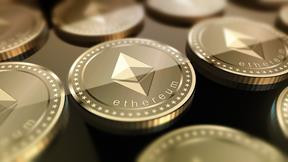Ether (ETH) prices surged above $3,500 ahead of the anticipated launch of Ether-based exchange-traded funds (ETFs) in the United States. This move has sparked a mixture of excitement and caution among investors, as the new financial products are set to begin trading on Tuesday. However, the market remains wary about potential inflow limitations and the impact of existing large-scale holdings, such as Grayscale's substantial ETH Trust.
Vivien Wong, a partner at HashKey Capital's Liquid Funds, highlighted the mixed sentiment in the market. "Market participants are also closely monitoring Grayscale's US$9 billion ETH Trust, as there are concerns that Grayscale's potential selling pressure could counteract the positive effects of the new inflows, potentially exerting downward pressure on the market," Wong noted in a statement to CoinDesk. HashKey, which helped launch one of the Ether ETFs in Hong Kong, estimates inflows of around $3 billion in the first six months of trading in the U.S.
Ether's inflation rate, another point of concern, has seen an unexpected increase. "Over the past month, the ETH supply increased by around approximately 60k ETH, contrary to expectations," Wong added. "While the ETH supply has decreased by approximately 300k ETH since the merge, continued inflation at this rate could negate this reduction within six months, potentially turning ETH into an inflationary asset again."
The anticipation of the ETFs has led to a modest gain in Ether's price, reversing losses from Monday's trading session to climb 0.57% in the past 24 hours, outperforming the broader CoinDesk 20 (CD20) index, which fell by 1.7%. Eight issuers, including financial giants like BlackRock, received approval for their latest S-1 filings from the U.S. Securities and Exchange Commission on Monday, paving the way for the launch.
Industry experts are debating whether these Ether ETFs will mirror the performance of Bitcoin ETFs, which were launched earlier this year and have since attracted over $17 billion in net inflows. Danny Chong, co-founder of Tranchess, expressed cautious optimism, stating, "The leading question is will ETH ETFs do better than Bitcoin ETFs? In technicality, Ethereum has more utility than Bitcoin with features like liquid staking. However, I do believe that with a larger investor base, ETH ETFs should be able to perform better and bring in the liquidity we require."
Citi has projected approximately $5.4 billion in inflows within the first half-year, attributing the lower figure compared to Bitcoin ETFs to the lack of staking and Bitcoin's first-mover advantage. Gemini estimates $5 billion, while JPMorgan forecasts inflows ranging from $3 billion to $6 billion, contingent on the inclusion of staking.
However, the absence of the staking mechanism in these ETFs has raised concerns. Staking allows Ethereum users to earn rewards by locking up their Ether to help secure the network, providing an annual percentage yield that was around 3.12% as of July 22, according to StakingRewards.com. "An institutional investor looking at ether knows that there are yields to be had," said Steven McClurg, head of U.S. asset management at CoinShares. "It's like a bond manager saying I will buy the bond, but I don't want the coupon, which is counter to what you're doing when you're buying bonds."
The SEC's decision to exclude staking from the ETFs stems from its interpretation that staking in exchange for tokens constitutes an investment contract, necessitating disclosures and safeguards under U.S. securities laws. This exclusion has led some investors to reconsider their participation in these ETFs, with McClurg indicating that CoinShares would not be involved in this round of Ether ETFs due to the lack of staking.
Nathan Gauvin, CEO of asset manager Gray Digital, expressed a similar sentiment, predicting that staking might be included in future iterations of the ETFs. "This is a midpoint to get there," Gauvin said, noting that his firm is also not participating in this launch but will monitor it closely.
Chanchal Smadder, head of product at ETC Group, echoed these concerns, comparing the current ETFs to owning a stock without the dividend. "Holding the ETF without the staking yield is like owning a stock and not having the right to the dividend," Smadder said. ETC Group's staked Ether exchange-traded products (ETPs) have seen higher demand compared to their unstaked counterparts.
Despite the reservations, some industry experts view the launch of Ether ETFs as a significant milestone for the crypto market. Nana Murugesan, president of Matter Labs, emphasized the broader implications, stating, "The ether ETFs launch is less about staking, but more a watershed moment in crypto. As Ethereum and its adoption grow, the ETF's value also grows with all the network effects."




